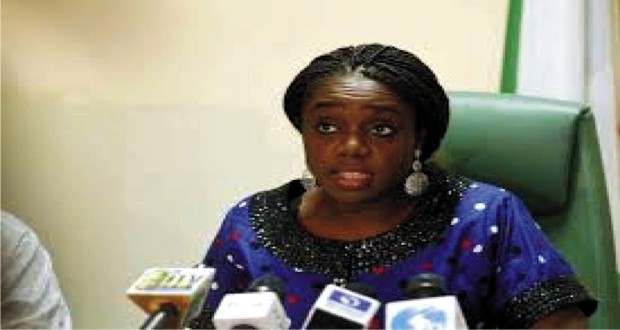Barely one week after the Central Bank Governor, Godwin Emefiele said the recession in the country will be over by December, the Minister of Finance, Mrs. Kemi Adeosun, has declared that she does not know when the economic recession in Nigeria will end.
Emefiele had said, “We are already in the valley, the only direction is to go up the hill and the government is doing everything possible to ensure that we move up the hill. I am optimistic that based on the actions being taken by the monetary and fiscal authorities, the fourth quarter results will show evidence that we have started to move out of recession.
“The worst is over. The Nigerian economy is on the path of recovery and growth. So, please if you are a bystander or sideliner, you are losing; join the train now before it leaves the station.”
But the minister said that some of the efforts of the government to boost the economy were yielding positive result.
Speaking over the weekened with newsmen in Abuja, Adeosun said, “I don’t want to predict when we will get out of recession. Let me tell you that we will get into growth and that’s how you get out of recession, because of the stimulus that we are providing.
“And it may take longer than we would like, but we will definitely get out of it. We are already seeing some positive signs in agriculture and solid minerals and with what we are trying to do with other sectors, I am very sure we will get out of it soon.”
The minister explained that despite the recession, lots of foreign investors were still interested in coming to Nigeria.
According to her, the Federal Government had yet to take a final decision on which of the country’s national assets would sold to finance the 2016 budget.
She said, “I think there are a number of assets that are being considered and I don’t think we have said this one or that one. There are some unused assets that are just lying idle, which people have come and suggested that ‘these things you are not using, can we lease them from you for money?’
“Hence, when they lease them from us, the taxes are still going to come to us. So, there are some things the government is sitting on, we don’t have money to do it; it makes sense for me to unlock those things to bring money into the economy at these difficult times so that we can move forward.
“We have not got to the stage of saying it’s this asset, or that. But should we just keep on borrowing or shall we know that things are a lot more difficult than we envisaged and turn on to an alternative strategy, which is looking at some of the underutilised assets and releasing them.”
She added, “We think that the infrastructure challenges that we face are so serious and the kind of money that we need, we can’t borrow. When you have an accumulated deficit, you need to look for the money that will sustain what you are doing for the next three to four years.
“That is what we are doing, having more of a strategic approach so that over time, we will borrow less, and which of course is good.”
When asked what type of sale arrangement the government was considering for the national assets, the minister said it depended on the asset classes.
She said, “It depends on which one. There are some assets which you can lease and others you may need to divest from. The investor will also have to look at the risks and the pricing. Some assets just make sense to just leave them and there are some, which you may just sell but still hold on to the majority stake.
“You can sell to the Nigerian people and list on the Nigerian Stock Exchange. So, there are different kinds of sales.”
When asked if she was disappointed that the Monetary Policy Committee of the Central Bank of Nigeria did not reduce the benchmark lending rate to make domestic borrowing attractive as suggested by her, the minister said the government would explore other cheaper sources of funds, particularly from international institutions.
She said, “We are looking at a range of options and one of the biggest issues for us was the cost of borrowing. Of course, the government is the biggest borrower. So, what we have said from the beginning was that we will look for cheaper funds to bring down our cost of borrowing.
“Currently, it is cheaper to borrow internationally than to borrow locally. So, we are working with the Debt Management Office to try and refinance some of the existing local debts into external to get lower interest rates and to structure them over the medium term.
“That will reduce our cost of debt servicing and increase the amount of money available for capital projects, which is really our focus.”

